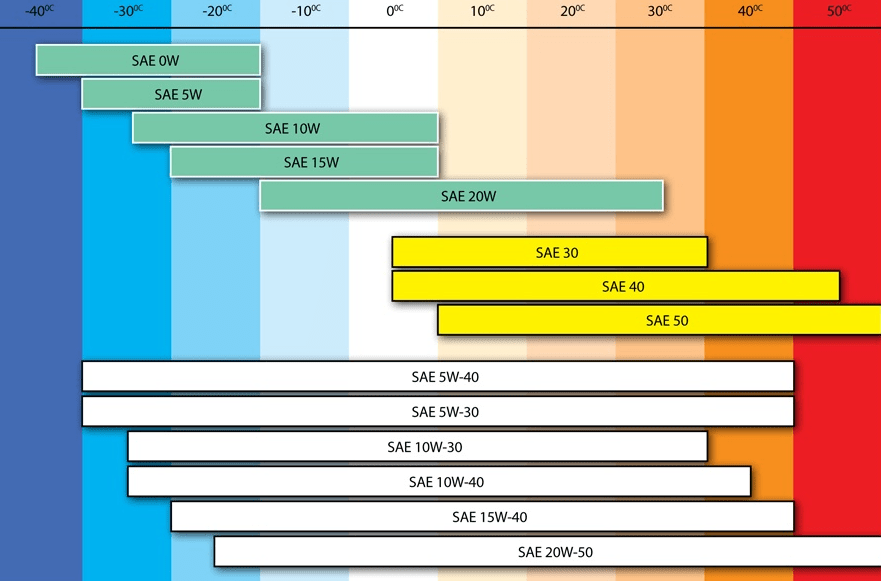Today’s market of lubricants offers a wide range of products for cars of all kinds of brands and models. However, with such a variety car owners are faced with a difficult problem of choice, trying to focus not only on the quality of engine oils, but also on their viscosity, seasonality, compatibility, and manufacturer. Thus, according to statistics, the most popular car oils, regardless of the brand, are fluids labeled 5w-30 and 5w-40. But despite the popularity of these products in automotive circles, few drivers know how these fluids differ from each other. Today we are going to find out what the difference is between 5w30 and 5w40, and which one is better to choose.
What is the difference between 5w30 and 5w40 motor oils?
The main criterion by which you can distinguish these two types of lubricants is the oil viscosity (SAE). It is the viscosity that is one of the main indicators of the performance characteristics of engine oil. According to the SAE classification, the first digit of the marking (5w30, 5w40) is an indicator of oil viscosity in the cold season, and the second (5w30, 5w40) – in the warm season. *The letter “W” is an abbreviation for the word winter.

As we can see, the indicators for the cold period in both oils are identical, indicating that both fluids will provide easy starting of the unit at temperatures down to -30°С. But the summer performance is different – the temperature range of 5w-40 is wider (up to +35 ° C) than that of 5w-30 (+30 ° C).
If you heat both fluids up to 100°C, the viscosity of 5w-30 will be in the range of 9.3 – 12.5 mm sq./sec. and 5W40 – 12.5 – 16.3 mm sq./sec. Thus, you can clearly see that the main difference between 5w30 and 5w40 is their viscosity (compared to 5w-30, during the heat 5W-40 will have a thicker structure). You should also pay attention to the fact that oil with index 30 will remain more fluid at low temperatures while maintaining its original viscosity. In its turn, 5W-40 will become thicker in winter, which quite often makes starting an internal combustion engine (especially in diesel engines) more difficult.
As for the chemical composition. Both oils have a fully synthetic composition with the only difference: 5w-30 has a higher degree of purification, which is especially important for diesel engines with particulate filters. Thanks to this the ash elements (soot, carbon monoxide, ash) are deposited less on the filter, prolonging its service life.
If the age of your vehicle does not exceed 7-10 years and the mileage is 75000-85000 km, the specialists at the Technical Service Centers recommend using 5w-30 engine oil. At mileage over 100000, it is desirable to switch to a more viscous fluid (i.e. if initially in the car-filled oil of small viscosity, then over time it must be changed to 5w40). Compatibility of 5w30 and 5w40 Many car owners have been wondering for a long time whether it is possible to mix 5w30 and 5w40 or not. If for any unforeseen reason it is necessary to refill the oil, and you don’t have at hand the product you need according to the instructions, in the extreme case you can mix 5w30 and 5w40 oil, but only if both lubricants are produced by the same brand. This minimizes the risk of raising the working temperature of the internal combustion engine and also provoking premature wear of the unit parts (engine cylinders, piston rings).
If the situation is urgent, it is acceptable to mix 5w30 and 5w40, produced by different manufacturers, but only if they have an identical base. However, it is still better not to allow the mixing of two liquids with different viscosities. There are a number of reasons for that. If by the manufacturer’s manual the engine must be filled with 5w30, and 5w40 is used instead, it will lead to premature engine wear, increased load on the oil pump, as well as increased friction between the parts because of the formation of a film of different density on them. Conversely. Using a more fluid grease 5w30 instead of 5w40 will result in a higher engine load since too thin a film can’t provide reliable protection of the rubbing parts.
Which oil is better – 5w30 or 5w40?
To summarize, we can say that the main task of engine lubrication is to form a film to protect rubbing surfaces. Each of the oils discussed today copes well with its task, and only the manufacturer knows which one is better for the engine of each specific vehicle. It is the car manufacturer that selects a particular type of fluid, taking into account the design features of the power unit
